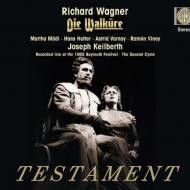Die Walküre 1955 – the second cycle
In 2006/07 Testament released for the first time ever (on 14 CDs – SBT14 1412) the legendary stereo recordings made by Decca at Bayreuth of the first cycle of the 1955 performances of the Ring, conducted by Joseph Keilberth and staged by the Festival’s co-director, the radical regisseur Wieland Wagner. Partly for recording security, partly out of interest, Decca’s engineers under producer Peter Andry also recorded the second cycle, from which this first-ever release of Die Walküre is drawn, providing a chance to appreciate the depth of New Bayreuth’s casting resources. Martha Mödl took over as Brünnhilde (she and Astrid Varnay regularly alternated in the Festival cycles between 1953 and 1956) and Varnay took over the role of Sieglinde from Gré Brouwenstijn, thus returning to the role with which she had made her first appearance anywhere on a professional stage – at the Metropolitan Opera in 1941.
Tannhäuser – the preserved excerpts
While taping both the Ring cycles and the performances of Der fliegende Holländer conducted that year by Joseph Keilberth (see Testament SBT2 1384), the Decca team also made some experimental recordings of parts of the Tannhäuser performances Keilberth conducted (he shared the opera in 1955 with André Cluytens). As can be heard in these preserved excerpts, the performances began with the early Dresden version of the overture (which includes its own Bacchanale and comes to a full concert close) and is then followed by the revised Paris version of the Bacchanale complete with choral ending – providing the Wieland/Gertrud production team with extended dance opportunities. Despite his personal feelings, Keilberth inspires his orchestra here to a Toscanini-like sensuality in the dance music. The section recorded from Act III catches the young Dietrich Fischer-Dieskau in his second year at the festival and shows the risks that Wolfgang Windgassen was prepared to take with the role of Tannhäuser – employing, as Wagner himself asked for at the opera’s Paris première in 1861 (and his grandson Wieland similarly demanded in his new Bayreuth stage production), a deliberately hoarse, broken tone for this failed pilgrim’s search for grace. Extract from the booklet note Mike Ashman, 2008



